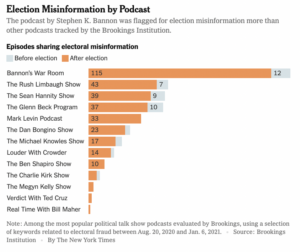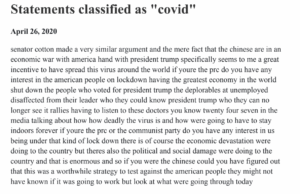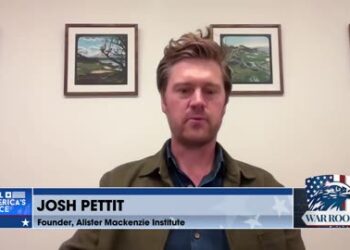The New York Times in concert with The Brookings Institution appear to be advocating for increased censorship of conservative podcasts that address topics like election fraud and alternative COVID-19 treatments by alleging that these shows are serial spreaders of “misinformation.”
The article, “Election Falsehoods Surged on Podcasts Before Capitol Riots, Researchers Find,” is a perfect example of agenda-driven journalism, which, in this case, appears to be de-platforming programs such as The Sean Hannity Show, The Charlie Kirk Show, the Mark Levin Podcast in addition to War Room.
The article seeks to imply that the aforementioned shows and the unregulated sharing of election fraud-related information are culpable for the events of January 6th. (Put simply: censor shows that defy establishment-sanctioned narratives or else January 6th-style events will happen ad infinitum.)
The New York Times is regurgitating analysis from The Brookings Institution, alleging that War Room was the top spreader of election “misinformation.” While what constitutes “misinformation” is a wholly subjective matter, it’s clear The New York Times’s use of the establishment, Washington, D.C. think tank’s report is part of an effort to make its anti-conservative agenda seem more legitimate in the eyes of the reader.
It’s a perfect example of The New York Times information laundering on behalf of the Brookings Institution, and it’s clear that “misinformation” translates to any narrative that doesn’t conform with the talking points of the establishment and the Biden regime.

As the article explains the Brookings Institution’s report and methodology:
“Researchers at the Brookings Institution reviewed transcripts of nearly 1,500 episodes from 20 of the most popular political podcasts. Among episodes released between the election and the Jan. 6 riot, about half contained election misinformation, according to the analysis.
In some weeks, 60 percent of episodes mentioned the election fraud conspiracy theories tracked by Brookings. Those included false claims that software glitches interfered with the count, that fake ballots were used, and that voting machines run by Dominion Voting Systems were rigged to help Democrats. Those kinds of theories gained currency in Republican circles and would later be leveraged to justify additional election audits across the country.”
The key point of the article, however, appears to be calling attention to the alleged lax regulation of “misinformation” spread by podcasts on platforms operated Apple, Google, Spotify and more. Appearing to be an attempt to lay the groundwork for broadening podcast content regulation, The New York Times explains:
“The new research underscores the extent to which podcasts have spread misinformation using platforms operated by Apple, Google, Spotify and others, often with little content moderation. While social media companies have been widely criticized for their role in spreading misinformation about the election and Covid-19 vaccines, they have cracked down on both in the last year. Podcasts and the companies distributing them have been spared similar scrutiny, researchers say, in large part because podcasts are harder to analyze and review.”
Similarly, War Room appears to be a primary target in the article, with journalist Stuart Thompson noting that “Mr. Bannon's show was removed from YouTube shortly after Jan. 6, for instance, but the podcast remains available on Google's Podcasts app.”
Additional data from the Brookings Institution Report reveals that COVID-19 narratives, particularly the virus’ origins and potential treatments, were also analyzed by researchers. The timespan of COVID-19-related “misinformation” ranges from April to December 2020, which calls into question how researchers could have disqualified any discussion about COVID-19 treatments or origins as incorrect, as it was still early in the pandemic. No conclusive studies or investigations into the origins of the pandemic or efficacy of drugs had been published.
Moreover, much of War Room’s reporting on these issues had to do with exposing people tied to the Chinese Communist Party and pharmaceutical giants like Pfizer for their efforts to stonewall investigations into the true origins of COVID-19 and effective treatments for the virus.
For example, a flagged statement from April 26th, 2020 explicitly notes that “even if [COVID-19] didn’t start out as a bioweapon attack it certainly ended up as one,” while outlining how COVID-19 could potentially function as a form of Chinese Communist Party unconventional warfare.

Other flagged statements for the Brookings Institution report center on Hydroxychloroquine as a potential COVID-19 remedy, though War Room’s coverage of the medication focused on developments from studies about the drug and always stopped short of officially endorsing it as a cure to COVID-19.
A co-author of the report, Chris Meserole, also has a history of collaborating with Chinese Communist Party-run institutions including Tsinghua University. He spoke at the school’s AI Cooperation and Governance Forum in 2020 despite the school repeatedly launching cyberattacks against the U.S. government, retaining a "clear connection" to the Chinese government on technology and national security affairs, and is the alma mater of Xi Jinping.
Xi appears to retain ties with the university, as he recently met with the institution's advisory board at the Chinese Communist Party's Great Hall of the People.
Tsinghua University's journalism school is also the top training ground for the next generation of propagandists working for Chinese state-run media outlets. An introductory letter from the school's dean outlines its purpose: to accomplish the "tasks for news media" outlined by the Central Committee of the Chinese government.
In order to "cultivate talented professionals" who can "achieve these goals," the school seeks to apply Marxism â€" dubbed the "correct political orientation" â€" to journalism:
"We should be committed to a firm and correct political orientation. Our School has been actively exploring the theory and practices of Marxist Journalism, namely, to applying the Marxist theory in observing the world, selecting and handling news production."
The Brookings Institution retains even deeper ties to the Chinese Communist Party through its Thornton China Center, as its namesake chairs a company backing China’s controversial global infrastructure initiative and has relations with an alleged Chinese propaganda operation.
John L. Thornton, the chairman emeritus of the Brookings board of trustees, has served as chairman of the Silk Road Finance Corporation since 2016, as revealed by The Washington Free Beacon. The company is backed by the Chinese Communist Party and develops projects to expand the Belt and Road Initiative, which the U.S. government considers a national security threat trying to replace America as a global hegemon. Thornton is also affiliated with Confucius Institutes, which Beijing weaponizes to spread communist propaganda in American schools.
Unsurprisingly, fellows at the Thornton China Center have defended “Belt and Road” and Confucius Institutes. It has also hosted multiple forums in recent years to encourage Belt and Road projects in the Middle East.
The Brookings Institution has also partnered with the Shanghai Academy of Social Sciences, which the Federal Bureau of Investigation has investigated for luring Americans to engage in espionage, and has taken hundreds of thousands of dollars from a premier Chinese Communist Party influence group known as the China-United States Exchange Foundation (CUSEF).
CUSEF was founded by the Vice-Chairman of the "highest-ranking entity overseeing" China's United Front, which the U.S.-China Security and Economic Review Commission identifies as seeking to "to co-opt and neutralize sources of potential opposition to the policies and authority of its ruling Chinese Communist Party" and "influence overseas Chinese communities, foreign governments, and other actors to take actions or adopt positions supportive of Beijing."
Journalists from The New York Times have also taken free trips to China in exchange for “favorable coverage” from CUSEF.
Before the Brookings Institution falsely accuses War Room of spreading misinformation, it may want to check the actual propaganda being spewed by some of its foremost partners and backers.



